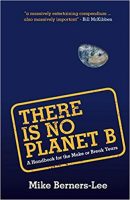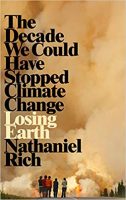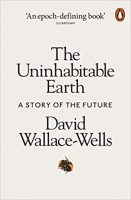

 I’ve flown only once this year, and I’ve promised (with others on Flight Free UK) not to fly at all in 2020. An odd thing to do when you’ve made much of your living for years as a travel writer and editor. But I’m not alone, even in my trade, in trying to fly less. Several of my colleagues have done likewise. We’ve all decided that we don’t want to encourage readers — even indirectly — to burn more oil at a time when everyone should be burning less.
I’ve flown only once this year, and I’ve promised (with others on Flight Free UK) not to fly at all in 2020. An odd thing to do when you’ve made much of your living for years as a travel writer and editor. But I’m not alone, even in my trade, in trying to fly less. Several of my colleagues have done likewise. We’ve all decided that we don’t want to encourage readers — even indirectly — to burn more oil at a time when everyone should be burning less.
A strange time it is, when the president of the United States is denying that climate change is as dangerous as his own officials tell him, and yet an airline is asking potential passengers to consider reducing their carbon footprint — by avoiding flying. KLM is doing that right now on its own website. Why? Because, it says, “aviation is far from sustainable today, even if we have been — and are — working hard to improve every aspect of our business”.
In a report last October, the UN Intergovernmental Panel on Climate Change (IPCC), which brings together leading scientists, gave warning that we have only a dozen years to keep global warming to a maximum of 1.5C, beyond which even half a degree will significantly worsen the risks of drought, floods, extreme heat and poverty for hundreds of millions of people. “It’s a line in the sand, and what it says to our species is that this is the moment and we must act now,” said Debra Roberts, a co-chair of the working group on impacts.
The indicators haven’t improved since then, but governments still don’t seem to have got the message. The UN gathering in Madrid, which finished yesterday with a compromise deal, hardly suggests a collective resolve to save the planet.
Alden Meyer, director of strategy and policy for the Union of Concerned Scientists, who has been attending climate talks since the early 1990s, told The Washington Post: “You have the science crystal on where we need to go. You have the youth and others stepping up around the world in the streets pressing for action. It’s like we’re in a sealed vacuum chamber in here, and no one is perceiving what is happening out there — what the science says and what people are demanding.”
Having been slow to tune in myself, I’m now trying to catch up. I’ve read almost as much on climate this year as on travel, so I’m in a position to recommend a few primers. Boris Johnson, in his victory speech last week, promised “colossal new investments in infrastructure and science, using our technological advantages to make this country the cleanest, greenest on Earth”, so I’m sure he’s already ordered a copy of each of the books below for every member of his cabinet.
First, The Uninhabitable Earth by David Wallace-Wells (Penguin), which spells out how climate change is going to touch every aspect of our lives, from the food we eat to the places we live in (or can no longer live in) and the stories we tell ourselves. It shows how, through “ignorance, then indolence, then indifference”, we’ve made for ourselves “a gaseous suicide, a running car in a sealed garage”.
Nathaniel Rich, in Losing Earth: The Decade We Almost Stopped Climate Change (Picador), explains how, in the 1980s, our leaders squandered opportunities to lessen the damage. His book began life as an article for The New York Times Magazine, which you can still read online.
Then there’s There Is No Planet B by Mike Berners-Lee (Cambridge University Press). In this handbook for what he calls “the make-or-break years”, he sets out what we can and must do now. He makes it clear that systemic change is essential, and that governments and industry must lead it. But he also encourages individuals to do their bit: “We need to think beyond the immediate and direct effect of our actions and ask more about the ripples that they send out, and how the actions of one person, company or country might get multiplied rather than muffled…”
In the video below, which went online a couple of weeks ago, Professor Berners-Lee explains some of the themes he tackles in the book. He also touches on developments that worry him, and on others that give him hope.

Leave a Reply